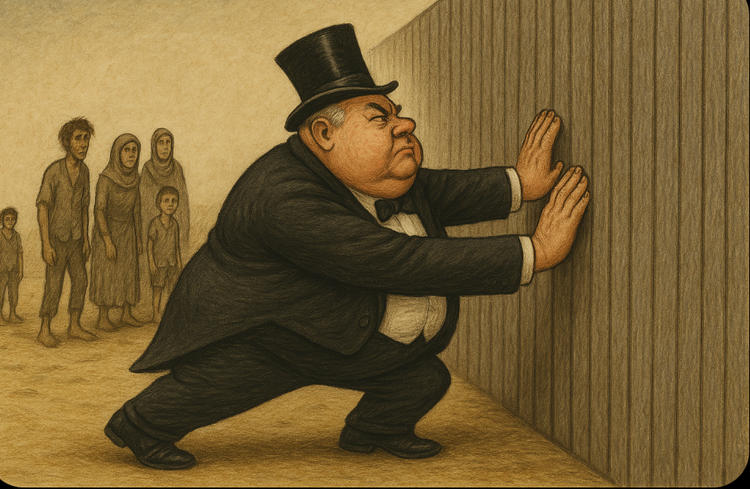Import taxes will be passed onto the consumer, while the rich will prosper from slashed taxes.
by Omar Ocampo | –
( Inequality.org ) – Trump’s trade policies have been wildly unpredictable in the first two months of his second presidency. Tariff deadlines have come and been delayed with no rhyme or reason, leaving cross-border trade in the lurch.
Such volatility was a nightmare for investors in the top one percent, but they are now given some clarity thanks to the inauguration of Trump’s so-called “Liberation Day” — a comprehensive set of retaliatory tariffs imposed on all imported products from trading partners who allegedly disadvantage US exports through their own regulatory regime.
But this class of high net worth individuals have no reason to be nervous or anxious. They are set to see long-term monetary gains because they have the resources to properly adapt and make financial decisions that expand their capital, not to mention the economic benefits they will receive from the tax cut that is currently part of the Republican agenda.
Yet the same cannot be said for the working-class. The indiscriminate deployment of taxes on all imported goods is a blatant attack on their living standards.
And that is because Trump’s trade war is a class war designed not to revitalize American manufacturing, but to weaken progressive taxation.
The Trump administration has argued that the implementation of tariffs is critical to ushering in a new era of American prosperity. The administration expects his tariff regime to generate a massive windfall in tax revenue, making trillions of dollars available to the federal government over the next several years. The money raised can then be used to reduce the deficit and service our ever-growing national debt.
Government coffers will be overflowing with so much revenue — so the argument goes — that the IRS can be abolished and replaced with a new agency, the External Revenue Service. Federal income taxes will gradually become obsolete and be thrown into the dustbin of history, never to be resurrected again.
Experts and observers have already refuted many of the core arguments advanced by Trump and his cronies. The nonstrategic deployment of tariffs will not make American manufacturing great again and the math does not support the administration’s fantastical revenue estimates.
To boost domestic manufacturing, tariffs need to be implemented and targeted towards industries with relatively low but growing demand. Renewable technologies and electric vehicles are two quintessential examples. Otherwise, tariffs on highly competitive goods will inflate prices and put US corporations at a disadvantage against their foreign competitors.
Furthermore, these import taxes will not be paid by foreign firms or countries. The tariffs will be paid by US citizens and residents, and it will make an array of imported consumer goods more expensive, putting a greater strain on the budgets of working-class households. One estimate says that “liberation day” will reduce disposable income of the average household by at least $1,600 and as much as $2,000. In short, it will not enrich our citizens.

“Trade Parasite,” Digital, ChatGPT, 2025
Higher prices may boost corporate profits if consumption levels remain constant, but there is no guarantee that this extra revenue will be invested into expanding the productive capacity of the country. Corporate profits have soared over the past 50 years and these earnings were not invested in domestic manufacturing, but instead they were distributed to support excessive executive pay, dividend payments to shareholders, and record-breaking stock buybacks.
Tariffs, if anything, exacerbate the already existing problem of extreme inequality. When the economic pie of the rich expands, they will use these new resources to extract more wealth from the working-class through the acquisition of critical assets like residential housing and infrastructure that we rely upon like energy plants, often through private equity and asset management firms.
These investment management firms rarely improve quality of service delivered, but they do raise prices to ensure higher profitability for their wealthy clients.
The only way to reverse our deteriorating standards of living and extreme wealth concentration is by taxing the rich and increasing the availability and accessibility of public goods.
The tariffs implemented today and the tax cuts to come will do little to fulfill Trump’s promises of balancing the budget, spurring investment into manufacturing, raising revenue, or creating new jobs with dignified wages. It does not help or deliver benefits to the working-class, but it will transfer more of their hard-earned wealth and income to the top.
Omar Ocampo is a researcher at the Program on Inequality and the Common Good at the Institute for Policy Studies.
Via Inequality.org
Content licensed under a Creative Commons 3.0 License


 © 2025 All Rights Reserved
© 2025 All Rights Reserved